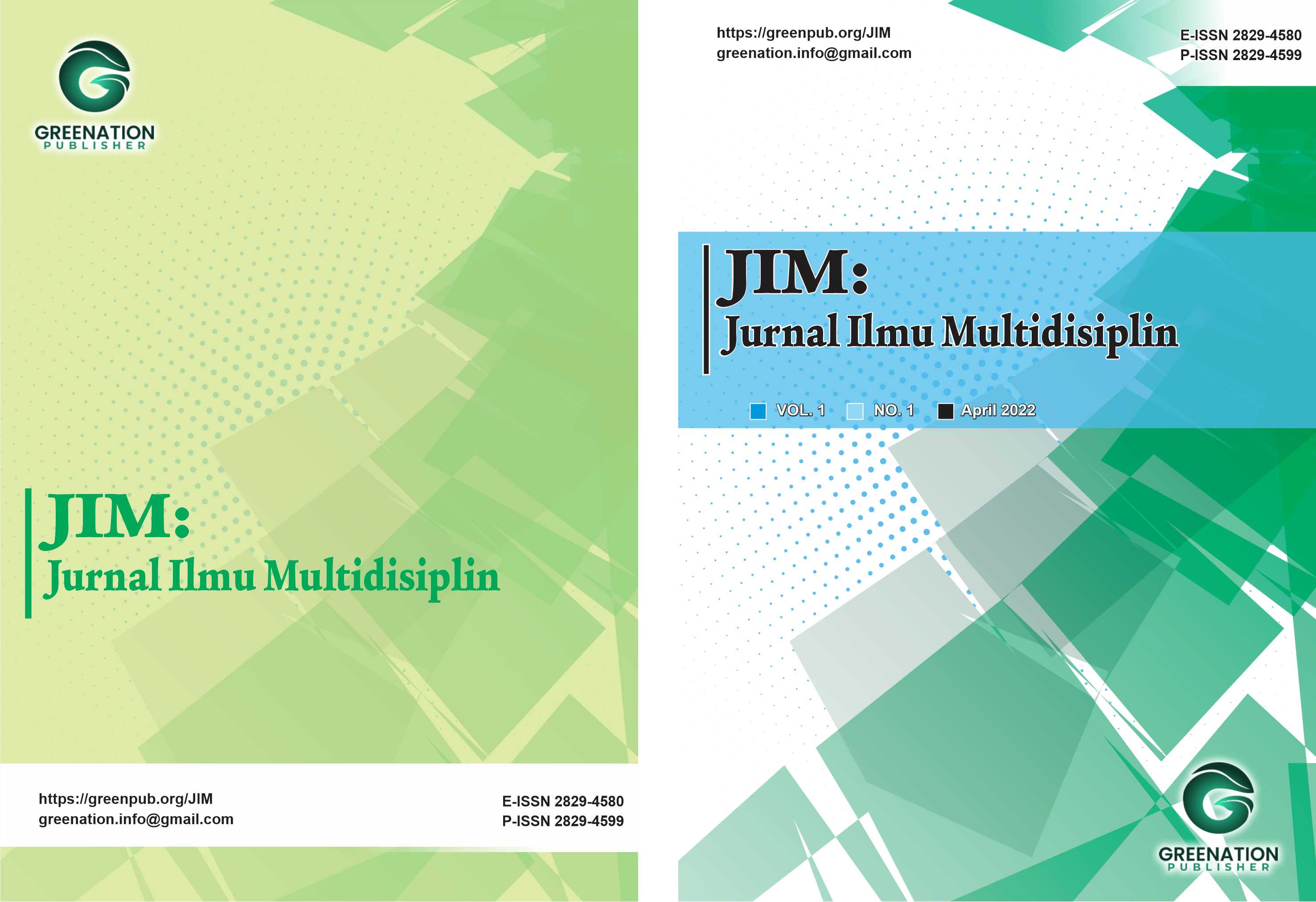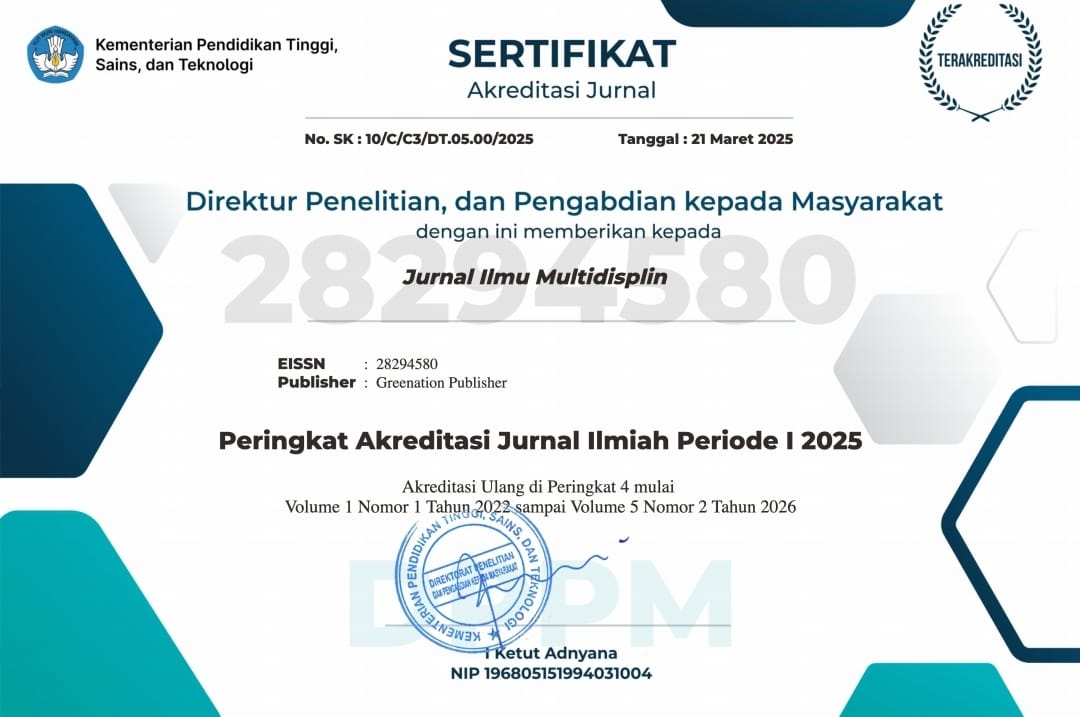Life Satisfaction in the Workplace: A Systematic Literature Review of Contributing Factors and Theoretical Perspectives
DOI:
https://doi.org/10.38035/jim.v4i3.1186Keywords:
Kepuasan Hidup, Systematic Literature Review, Lingkungan KerjaAbstract
Kepuasan hidup merupakan salah satu indikator penting dalam mengukur kesejahteraan individu, yang memiliki implikasi signifikan dalam konteks psikologi industri dan organisasi. Penelitian ini bertujuan untuk menyusun tinjauan sistematis terhadap literatur yang ada mengenai kepuasan hidup, dengan fokus pada faktor-faktor yang mempengaruhi dan konsekuensinya dalam lingkungan kerja. Metode Systematic Literature Review (SLR) digunakan untuk mengidentifikasi, mengevaluasi, dan mensintesis temuan-temuan dari berbagai studi yang relevan. Melalui pencarian publish and perish, sebanyak 12 artikel yang memenuhi kriteria inklusi dipilih untuk dianalisis lebih lanjut. Hasil kajian ini menunjukkan bahwa kepuasan hidup dipengaruhi oleh sejumlah faktor seperti keseimbangan kerja-kehidupan, dukungan sosial, lingkungan kerja, dan aspek personal seperti kepribadian dan kesehatan mental. Selain itu, kepuasan hidup juga berkontribusi pada berbagai hasil organisasi, termasuk kinerja kerja, keterlibatan karyawan, dan retensi. Temuan ini memberikan wawasan berharga bagi praktisi dan peneliti untuk mengembangkan intervensi yang dapat meningkatkan kepuasan hidup dan, pada akhirnya, produktivitas organisasi. Penelitian ini juga mengidentifikasi kesenjangan dalam literatur saat ini dan menawarkan rekomendasi untuk penelitian di masa depan.
References
Allan, B. A., Batz-Barbarich, C., Sterling, H. M., & Tay, L. (2019). Outcomes of meaningful work: A meta?analysis. Journal of Management Studies, 56(3), 500–528.
Anglim, J., Horwood, S., Smillie, L. D., Marrero, R. J., & Wood, J. K. (2020). Predicting psychological and subjective well-being from personality: A meta-analysis. Psychological Bulletin, 146(4), 279–323.
Bakker, A. B., & Demerouti, E. (2007). The Job Demands–Resources model: State of the art. Journal of Managerial Psychology, 22(3), 309–328.
Cooper, C. L., Dewe, P. J., & O’Driscoll, M. P. (2001). Organizational stress: A review and critique of theory, research, and applications. Sage.
Deci, E. L., & Ryan, R. M. (2008). Hedonia, eudaimonia, and well-being: An introduction. Journal of Happiness Studies, 9(1), 1–11.
Demerouti, E., Bakker, A. B., Nachreiner, F., & Schaufeli, W. B. (2001). The job demands-resources model of burnout. Journal of Applied Psychology, 86(3), 499–512.
Diener, E. (2000). Subjective well-being: The science of happiness and a proposal for a national index. American Psychologist, 55(1), 34–43.
Greenhaus, J. H., & Allen, T. D. (2011). Work–family balance: A review and extension of the literature. In J. C. Quick & L. E. Tetrick (Eds.), Handbook of occupational health psychology (2nd ed., pp. 165–183). American Psychological Association.
Holland, P., Tham, T. L., Sheehan, C., & Cooper, B. (2019). The impact of perceived workload on nurse satisfaction with work-life balance and intention to leave the occupation. Applied Nursing Research, 49, 70–76.
Huebner, E. S. (2004). Research on assessment of life satisfaction of children and adolescents. Social Indicators Research, 66(1), 3–33.
Irawanto, D. W., Novianti, K. R., & Roz, K. (2021). Work from home: Measuring satisfaction between work–life balance and work stress during the COVID-19 pandemic in Indonesia. Economies, 9(3), 96.
Judge, T. A., & Bono, J. E. (2001). Relationship of core self-evaluations traits—self-esteem, generalised self-efficacy, locus of control, and emotional stability—with job satisfaction and job performance: A meta-analysis. Journal of Applied Psychology, 86(1), 80–92.
Judge, T. A., Locke, E. A., Durham, C. C., & Kluger, A. N. (2001). Dispositional effects on job and life satisfaction: The role of core evaluations. Journal of Applied Psychology, 83(1), 17–34.
Kahn, R. L., & Byosiere, P. (1992). Stress in organizations. In M. D. Dunnette & L. M. Hough (Eds.), Handbook of industrial and organizational psychology (2nd ed., Vol. 3, pp. 571–650). Consulting Psychologists Press.
Karakose, T., Yirci, R., & Papadakis, S. (2021). Exploring the interrelationship between COVID-19 phobia, work–family conflict, family–work conflict, and life satisfaction among school administrators for advancing sustainable management. Sustainability, 13(15), 8654.
Kumar, P., Kumar, N., Aggarwal, P., & Yeap, J. A. L. (2021). Working in lockdown: The relationship between COVID-19 induced work stressors, job performance, distress, and life satisfaction. Current Psychology, 1–16.
Locke, E. A. (1976). The nature and causes of job satisfaction. In M. D. Dunnette (Ed.), Handbook of industrial and organizational psychology (pp. 1297–1349). Rand McNally.
Luthans, F., Avolio, B. J., Avey, J. B., & Norman, S. M. (2007). Positive psychological capital: Measurement and relationship with performance and satisfaction. Personnel Psychology, 60(3), 541–572.
Muttaqin, D. (2022). Invariansi pengukuran gender dan usia dari Satisfaction with Life Scale versi Indonesia. Jurnal Psikologi Ulayat: Indonesian Journal of Indigenous Psychology, 9(2), 208–215.
Nielsen, K., Randall, R., Holten, A. L., & González, E. R. (2010). Conducting organizational-level occupational health interventions: What works? Work & Stress, 24(3), 234–259.
Prayag, G., Spector, S., Orchiston, C., & Chowdhury, M. (2020). Psychological resilience, organizational resilience and life satisfaction in tourism firms: Insights from the Canterbury earthquakes. Current Issues in Tourism, 23(10), 1216–1233.
Qudsyi, H., Novitasari, R., Ambarito, T. P., & Fakhrunnisak, Y. E. (2015). Kepuasan hidup orang yang bekerja ditinjau dari faktor pribadi, pekerjaan, dan pasangan. Dalam Prosiding Seminar Ilmiah Konferensi Seri ke-V (hal. xxx–xxx). Universitas Islam Indonesia.
Ruggeri, K., Garcia-Garzon, E., Maguire, Á., Matz, S., & Huppert, F. A. (2020). Well-being is more than happiness and life satisfaction: A multidimensional analysis of 21 countries. Health and Quality of Life Outcomes, 18, Article 192.
Ruiz-Fernández, M. D., Pérez-García, E., & Ortega-Galán, Á. M. (2020). Quality of life in nursing professionals: Burnout, fatigue, and compassion satisfaction. International Journal of Environmental Research and Public Health, 17(4), 1253.
Ryan, R. M., & Deci, E. L. (2000). The darker and brighter sides of human existence: Basic psychological needs as a unifying concept. Psychological Inquiry, 11(4), 319–338.
Ryan, R. M., & Deci, E. L. (2001). On happiness and human potentials: A review of research on hedonic and eudaimonic well-being. Annual Review of Psychology, 52(1), 141–166.
Salovey, P., & Mayer, J. D. (1990). Emotional intelligence. Imagination, Cognition and Personality, 9(3), 185–211.
Saks, A. M. (2006). Antecedents and consequences of employee engagement. Journal of Managerial Psychology, 21(7), 600–619.
Schaufeli, W. B., & Bakker, A. B. (2004). Job demands, job resources, and their relationship with burnout and engagement: A multi-sample study. Journal of Organizational Behavior, 25(3), 293–315.
Shanafelt, T. D., West, C. P., Sinsky, C., Trockel, M., Tutty, M., Wang, H., Carlasare, L. E., & Dyrbye, L. N. (2022). Changes in burnout and satisfaction with work-life integration in physicians and the general US working population between 2011 and 2020. Mayo Clinic Proceedings, 97(3), 491–506.
Sonnentag, S. (2001). Work, recovery activities, and individual well-being: A diary study. Journal of Occupational Health Psychology, 6(3), 196–210.
Veenhoven, R. (1996). The study of life-satisfaction. Dalam W. E. Saris, R. Veenhoven, A. C. Scherpenzeel, & B. Bunting (Eds.), A comparative study of satisfaction with life in Europe (hal. 11–48). Eötvös University Press.
Wiklund, J., Nikolaev, B., Shir, N., Foo, M. D., & Bradley, S. (2019). Entrepreneurship and well-being: Past, present, and future. Journal of Business Venturing, 34(4), 579–588.
Zhang, S. X., Wang, Y., Rauch, A., & Wei, F. (2020). Unprecedented disruption of lives and work: Health, distress and life satisfaction of working adults in China one month into the COVID-19 outbreak. Psychiatry Research, 288, 112958.
Downloads
Published
How to Cite
Issue
Section
License
Copyright (c) 2025 Gilang Permana Putra, Lussy Dwiutami Wahyuni, Zarina Akbar

This work is licensed under a Creative Commons Attribution 4.0 International License.
You are free to:
- Share— copy and redistribute the material in any medium or format
- Adapt— remix, transform, and build upon the material for any purpose, even commercially.
The licensor cannot revoke these freedoms as long as you follow the license terms.
Under the following terms:
- Attribution— You must give appropriate credit, provide a link to the license, and indicate if changes were made. You may do so in any reasonable manner, but not in any way that suggests the licensor endorses you or your use.
- No additional restrictions— You may not apply legal terms or technological measures that legally restrict others from doing anything the license permits.
Notices:
- You do not have to comply with the license for elements of the material in the public domain or where your use is permitted by an applicable exception or limitation.
- No warranties are given. The license may not give you all of the permissions necessary for your intended use. For example, other rights such as publicity, privacy, or moral rightsmay limit how you use the material.



























